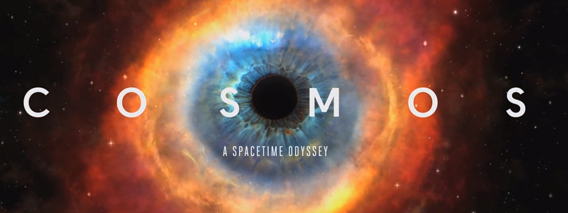Last night was the much-anticipated premiere of Neil deGrasse Tyson’s new Cosmos series, which looks to be an amazing adventure that should spark the imagination of future scientists everywhere. We’ll have more to say about this later, but today I want to venture back in spacetime to Carl Sagan’s original series.

Nineteen-eighty was a momentous year for me, though I was but a wee lad. On May 18, Mt. St. Helens erupted, igniting in me a lifelong fascination with geology. And four months later, Cosmos appeared and the genius of Carl Sagan exploded into my consciousness. His later work, particularly The Demon-Haunted World, would influence much of my thinking about the nature of science and the nature of those who reject it.
There have been shamefully few instances of real scientists presenting real science on American television, but the Cosmos series was an exception--a stark exception, groundbreaking in the depth and detail of its explanations of the state of knowledge about our universe and our history. This series became a McLuhanesque event, uniting a global village of those fascinated by science with those who practice science. What’s not to like about helping the curious learn more about the universe? What could be better than presenting serious scientific information in such an accessible way that everyone comes away better informed? Who doesn’t love Cosmos?
Well, creationists for one. Many took deep umbrage at Cosmos’s existence and messages.
Answers in Genesis, perhaps the most influential creationist organization in the United States, inveighed against Sagan’s series thus:
Many students, for example, have been required to watch and discuss the 13-part television series ‘Cosmos’ … In the first sentence of his book Cosmos (which is meant to supplement the television series), Sagan confidently declared in capital letters that ‘THE COSMOS IS ALL THAT IS OR EVER WAS OR EVER WILL BE.’<
and
We hear much about that great ‘wall of separation’ that the framers of the USA’s Constitution were supposed to have erected to protect Americans from state-mandated religion. But are they to also be protected from state-mandated instruction in evolutionary beliefs and speculations that threaten to undermine the religious beliefs of many of their students?
Creationists quickly seized on Sagan’s “the cosmos is all that is” quote as evidence that his PBS series was some dastardly and nefarious plot to expropriate taxpayer money in the service of promoting atheism. One such example of this line of reasoning came from the Discovery Institute:
The U. S. ‘Public’ Broadcasting System (PBS) has a long history of promoting materialistic philosophy disguised as empirical science. In 1980, PBS brought us Carl Sagan's thirteen-part Cosmos series, which featured Sagan--in the name of Science--assuring us that ‘The Cosmos is all that is or ever was or ever will be.’
They just can’t seem to get over this quote, nor indeed the remaining content of the series. When Sagan talks about the discoveries of astronomy, they claim it is not science, but rather evil “materialistic philosophy.” When Sagan explains how the universe evolved, this is dismissed as “state-mandated instruction in evolutionary beliefs.”
The same sad phenomenon will no doubt happen with Neil deGrasse Tyson’s new Cosmos series, especially since it also opens with Sagan's "all that ever was" line, and because its executive producer Seth MacFarlane laid out part of his motivation for re-imagining the series this way:
I think that there is a hunger for science and knowing about science and understanding of science that hasn’t really been fed in the past two decades. We’ve had a resurgence of creationism and intelligent design quote-unquote theory.
It’s amazing—and somewhat disturbing—that in 2014 we’re still hearing the same anti-science arguments bandied around after 1980. But this shouldn’t come as much of a surprise; creationists haven’t had many original claims to make since the 1925 Scopes trial.
Neil deGrasse Tyson, on the other hand, is going to present a staggering wealth of new information, sharing the awe and wonder of discoveries about the universe made since the original series. And Cosmos should be as inspiring to the current generation as it was to previous ones.
